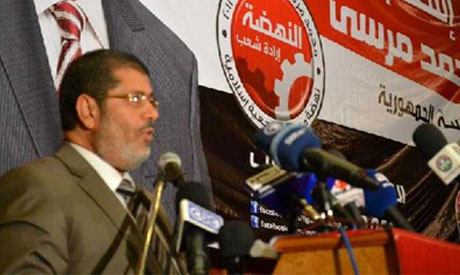 Thousands of Alexandrians turned out on Monday evening to support Muslim Brotherhood presidential candidate Mohamed Mursi in Egypt's coastal second city.
Thousands of Alexandrians turned out on Monday evening to support Muslim Brotherhood presidential candidate Mohamed Mursi in Egypt's coastal second city.
Since he announced plans to run for Egypt’s top post earlier this month, Mursi has been touring the country and holding public rallies to garner the people's support and speak about the group's "El-Nahda" project.
Although he has the formidable Brotherhood behind him and is the president of its political arm, the Freedom and Justice Party (FJP), he nevertheless must work hard for the people's approval after his 11th-hour appearance in the presidential race.
The Brotherhood had originally nominated its number-two, the charismatic Khairat El-Shater, to contest the race.
However, when the Supreme Presidential Elections Commission (SPEC) disqualified him due to a previous criminal conviction, Mursi entered the race as the MB’s alternate candidate – a fact that has rubbed many observers the wrong way.
"An alternate means he's not their first choice," said Naima Omar, who awaited Mursi's arrival at the square. "He also doesn’t have El-Shater's charisma."
Many also see El-Shater, not Mursi, as the architect behind the El-Nahda project.
Indeed, El-Shater has a star quality among Brotherhood supporters. He has been accompanying Mursi on his electoral tour to give the latter's campaign some additional momentum.
He was a no-show at Monday’s rally, however, but that didn’t stop his fans from going into hysterics when a tall bearded man – who looked like El-Shater – appeared on the stage.
For two hours before Mursi’s appearance, the Brotherhood used patriotic and Islamic music to excite the crowd. The rally was separated by gender, with the brothers (Ikhwan) on one side and the sisters (Akhawat) on the other.
The Mursi campaign's theme song – lyrics of which include "the Nahda is the will of the people, with Mursi we will overcome all obstacles" – could be frequently heard.
The music was briefly halted, however, to allow those assembled to perform sunset prayers, which were followed by yet more music and chanting. By the time Mursi arrived, the entire square was packed with supporters.
After a brief introduction, Mursi took to the podium to address the people. His speaking style was part presidential candidate, part Muslim preacher. He spoke about his plans for the country, took frequent swipes at ousted Egyptian president Hosni Mubarak, and quoted scripture, to which the crowds responded with a loud "amen."
"This is the Egypt we know – united in all squares across the country…believing that the revolution will continue and will not stop or slow down," Mursi told cheering supporters.
He then voiced his respect for all segments of Egyptian society, including FJP supporters, other political parties, farmers, workers, fisherman and the "martyrs" of last year's revolution.
"The martyrs of the revolution are on a high pedestal for us; they have already gone to heaven before us," Mursi said.
Mursi went on to stress that the Egyptian people desire stability and security above all else, promising to fulfill this desire were he to become president.
He then launched into a prayer for Egypt.
"God give Egypt peace," said Mursi. "Amen," responded the crowd. "God be generous to this nation, the dignity of which has been violated." "Amen," the crowd answered en masse.
Mursi then spoke of the difficulties Egyptians had faced in recent decades, watching as other countries developed and progressed as Egypt remained in a state of relative stagnation.
"The people prayed for this injustice to end and God responded by taking the injustice away and ridding us of Mubarak and his mafia," he said. "This should be a lesson for all...anyone who thinks he can take Egypt backwards again is destined to fail."
Mursi then reassured the crowd that, despite the FJP's Islamic frame of reference, it does not plan to force its ideas onto the people.
"God gave people the right to believe what they wish and to practice what they want," he said. "We have no right to force our ideas on them."
The presidential hopeful then added that the road to democracy in Egypt had already been paved, noting the unprecedented turnout in recent parliamentary elections.
"Now we have reached the next step, which is to choose a president," Mursi told the crowd.
He then stressed Egypt's traditional bounty, but noted that the people had been largely deprived of this bounty by the former regime. Referring to recent supply shortfalls of diesel fuel in Egypt, Mursi stressed that there was not, in fact, any shortage.
"We have diesel, but only on the black market," he said.
Mursi then directed scathing criticism at the ousted president for purposely promoting shortages of certain crops in Egypt just to please foreign governments.
"Mubarak once said that the US would be angry if Egypt ever planted enough wheat to sustain us," Mursi said.
He then launched into another Mubarak-era anecdote, this one about how an American NGO had promised to give the then-president LE10 million in aid on condition that he made sure that the Middle East "peace process" between the dispossessed Palestinian people and the Israeli occupation government was kept on track.
"And Mubarak bowed his head and said thank you," Mursi said. "But not me. I would never agree to something like that. The dignity of the Egyptian people is my first priority."
"But where is Mubarak now?" Mursi then asked the crowd.
"In prison!" the audience shouted in response.
After addressing the crowd for 45 minutes, Mursi departed the stage, promising supporters that he would see them again following next month's presidential elections.
On Wednesday, Mursi headed to Egypt's Sinai Peninsula to celebrate Sinai Liberation Day – a national holiday – with the local population.



